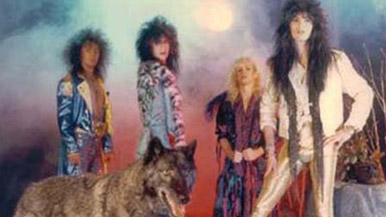Chapter Two
The Decline of Western Civilization Part II: The Metal Years
By Brett Ballard-Beach
June 21, 2012
By contrast, most of the new(er) bands profiled in The Metal Years may still be around 25 years later, in some form, but the musical performances Spheeris captures - by the likes of Odin, Seduced, and London - seem more likely to inspire resigned headshaking than headbanging, in 2012. Even more so than its musical differences, what distinguishes The Metal Years from parts I and III, is its backward-looking tone. The punk installments live in a fevered “now” driven by adrenaline and the saving grace of a two-minute song, contrasted with the lives of teens that seem so devoid of hope and opportunity, it becomes hard to imagine a tomorrow that could redeem them or a yesterday that they were able to live through. The Metal Years contrasts the up-and-comers, who display remarkable tenacity and blinkered positive thinking while making mostly generic music, with the “grizzled” icons of the business - KISS, Aerosmith, Ozzy Osbourne, Alice Cooper - as well as Poison, who was the commercial It band of the moment, and was still a few months away from the release of their biggest selling album “Open Up and Say . . . Ahh!”
The guys from Poison come across as likable, sex-obsessed jackasses (hey, they had just put an album in the top three on Billboard, had a top 20 hit and gone double platinum). KISS is represented by Paul Stanley (surrounded by four women in bed) and Gene Simmons (at a lingerie shop at the mall) and they inhabit the persona of gloating, seen-it-all-and-lived-to-tell-about-it pervs quite nicely. Tyler and Perry, who hadn’t even been clean a year yet at the time of their interview, are self-serious and perhaps a little self-satisfied, but when you’re working through the fact that you’re no longer inhaling mountains of cocaine, that you survived inhaling mountains of cocaine for a decade or so, and that it would be all too easy to fall back into the pattern of… the aura of faintly smug Zen becomes a little more understandable to this layperson. (They had also just released Permanent Vacation, marking the beginning of a commercial renaissance for them.)
By default, Osbourne, who is seen making breakfast for himself in his kitchen, comes across as the voice of reason, maturity, honesty, and self-deprecation. With more than a trace still left of a schoolboy’s face on his 40-year-old visage, and a twinkle/gleam in his eye and his voice, he’s immeasurably charming. Even if the kitchen setting seems directly staged to call to mind the sequence of The Germs’ Darby Crash - who would shortly be dead from a heroin overdose - cooking with his girlfriend in the first film, Ozzy seems at ease handling the bacon and eggs, and it balances the less savory facets of the film as an almost idyllic interlude.
As an interviewer, Spheeris keeps her face off-camera, but she is very much a character in all three films. She can be heard asking questions of her subjects, pushing for clarification, or posing what seem to be the most simple-minded queries, in an attempt to get the interviewees to address the most basic parts of themselves, the parts, perhaps that would be taken for granted. This doesn’t result in the most informative back-and-forth if her subjects (musicians or otherwise) have no capacity or desire for introspection, but she occasionally turns this to her advantage.
Continued:
1
2
3
4
|
|
|
|




